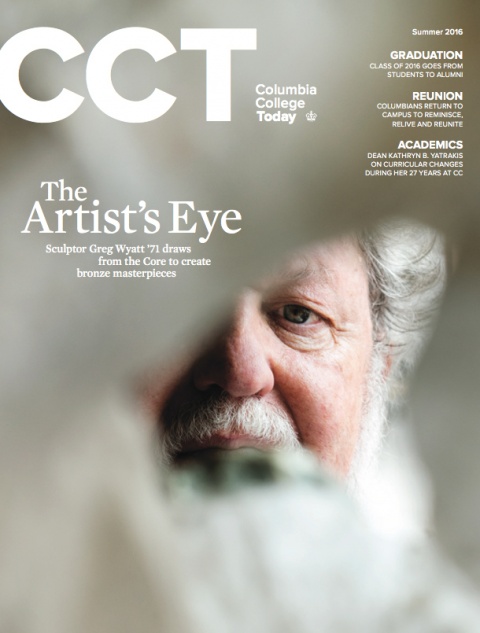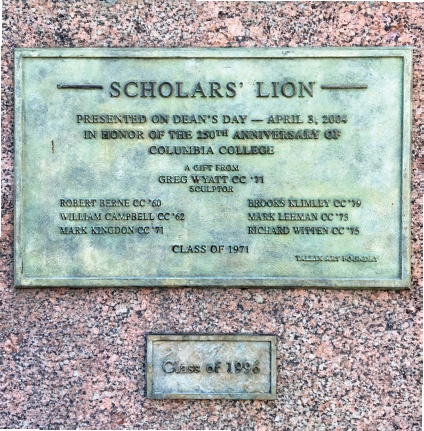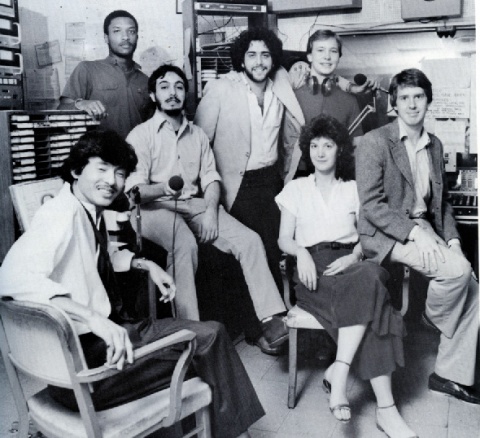Columbia College | Columbia University in the City of New York
Letters to the Editor
Scholar's Lion


ANNE-RYAN HEATWOLE JRN’09
Our class marshals met with Mr. Wyatt a number of times between 1995 and completion of the project to speak about our vision for a gift to the campus. I feel comfortable speaking for my class when I say that we are eternally grateful for the recent addition of a plaque with our class year to the base of this monumental addition to an already picturesque campus. At the same time, we acknowledge the fact that this project would not have been possible without the generosity of Mr. Wyatt, other members of the Class of 1971 and those listed on the initial plaque.
Dr. Uchenna Acholonu Jr. ’96
New Hyde Park, N.Y.
General Donovan
The Summer 2016 “Did You Know?” item on William J. Donovan (Class of 1905, LAW 1908), “Columbia’s CIA Connection,” had errors and significant omissions. Donovan received the Distinguished Service Cross in WWI but was also awarded the highest American military decoration, the Medal of Honor, as well as the Distinguished Service Medal. He thus enjoyed the singular honor of being awarded the three highest U.S. medals for wartime service. However, Donovan did not receive the Purple Heart, a medal instituted in 1932. Stripes on a uniform’s right sleeve indicated WWI combat wounds.
After Donovan returned from France in 1919, Assistant Secretary of the Navy Franklin Delano Roosevelt recruited his Law School friend as an agent of the Office of Naval Intelligence, and over the years the Republican Donovan made several overseas trips in a private capacity to gather intelligence for Roosevelt, the aspiring Democratic politician. After Roosevelt became President, he sent Donovan to report on the Ethiopian War from the Italian side and to observe Spanish Civil War operations. In winter 1940–41, under British auspices, Donovan undertook a 10-week information- gathering and secret diplomacy mission for the President in Europe, the Middle East and North Africa. By the time he became coordinator of information in mid-1941, Donovan had been collecting intelligence for Roosevelt for more than 20 years.
After his command of the Office of Strategic Services in WWII, Donovan began writing a book about Revolutionary War intelligence as organized by the true “Father of American Intelligence,” George Washington. He depicted espionage as an honorable American tradition, implicitly rebutting post-war Republican isolationists and advocating what became the CIA. In 1948, Donovan encouraged Gen. Dwight D. Eisenhower to accept the presidency of Columbia. But five years later, after his election as U.S. President, Eisenhower dashed Donovan’s hopes to become CIA director. Donovan’s unpublished manuscript is housed in Columbia’s Rare Book & Manuscript Library. A University monument to Donovan stands appropriately on the bridge between the main campus and the [Arthur W. Diamond] Law Library.
Brian R. Sullivan ’67, GSAS ’84
Rockville, Md.
[Editor’s note: Although the Purple Heart was instituted in 1932, it was retroactively awarded to those wounded in WWI who had previously received Meritorious Service Citation certificates or those authorized to wear wound chevrons. The monument mentioned in this letter is Tightrope Walker, on Revson Plaza near the Law School, created by Dutch artist Kees Verkade and installed in 1979. According to the Columbia University Libraries, “In choosing to depict two tightrope walkers, one balancing upon the shoulders of the other, Verkade wanted to display the courage and controlled daring of Gen. Donovan.”]
Good Memories
My Summer 2016 issue arrived this past weekend and I was saddened to learn that Jim McMillian ’70 had passed away. Thank you for your mentions of Jim, both in the editor’s column and “Obituaries.”

Left to right: Terumasa Hino, jazz trumpeter; Courtney Munroe GS’88, host of “Sounds of the Caribbean”; Ashley Kahn ’83, and a subject of a profile in that same issue; Andy Caploe ’83; Brooke Wentz BC’82, BUS’88, host of “Transfigured Night”; me; and Phil Hubbard GS’86, jazz host.
Many thanks to you and the CCT team. You do a wonderful job keeping us up to date on Columbia’s remarkable progress as well as helping us keep up with one another.
Jonathan Abbott ’84
Newton, Mass.
Representing CC
You have created in [the Summer 2016] issue of CCT a most memorable representation of Columbia College, and I compliment you on this outstanding achievement.
Sol Fisher ’36
Pleasant Hill, Calif.
A Good Chemist
I enjoyed the profile of chemistry professor Laura Kaufman ’97 [“The Essentials,” Summer 2016] and was surprised that she was able to take a variety of non-science courses when she was enrolled at the College. Because my schedule as a chemistry major in the 1950s was filled with required science and math courses in addition to the Core, I was only able to take a second year of Lit Hum and one semester of Eric Bentley’s course in modern drama. Kaufman was on the fence between applying to graduate school in chemistry or in English. Perhaps, before she made her choice, she read the words of Bazarov, the nihilist, in Turgenev’s Fathers and Sons: “A good chemist is twenty times as useful as any poet.”
Martin Feldman ’58
Silver Spring, Md.
A Question To Explore
I was amazed to read, in [the Class of 1952 Class Notes in the Summer 2016 issue,] Max Frankel ’52, GSAS’53’s pointed criticism of administration excess. Could this be the start of a probe into how and why in recent years universities have grown richer and students poorer? It is crushing for a 22-year-old to be saddled with debt. It stifles freedom to explore and create. Have students been sold a bill of goods? Are there legal remedies? These are questions for a great reporter to explore.
Barry J. Spinello ’62
Templeton, Calif.
Issue Contents
Published three times a year by Columbia College for alumni, students, faculty, parents and friends.
Columbia Alumni Center
622 W. 113th St., MC 4530, 6th Fl.
New York, NY 10025
212-851-7852
cct@columbia.edu
Columbia Alumni Center
622 W. 113th St., MC 4530, 4th Fl.
New York, NY 10025
212-851-7488
ccalumni@columbia.edu

